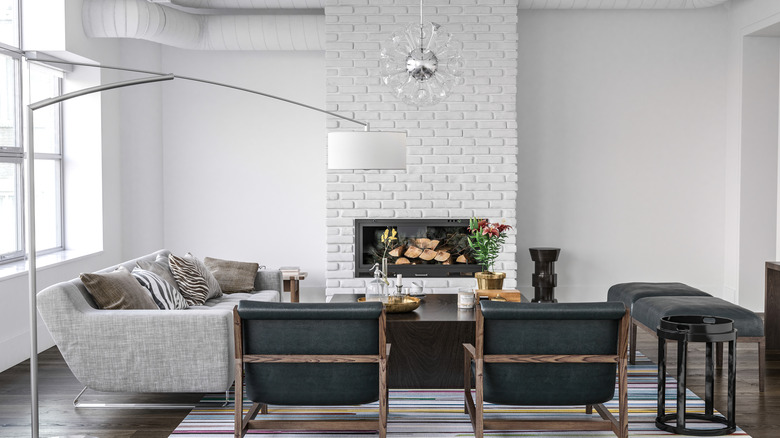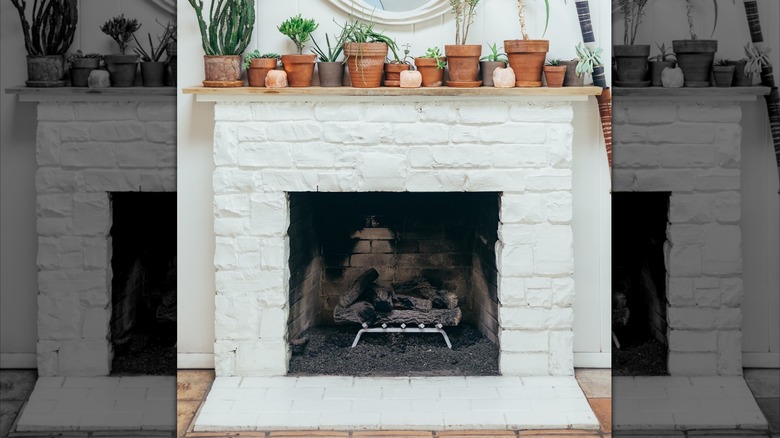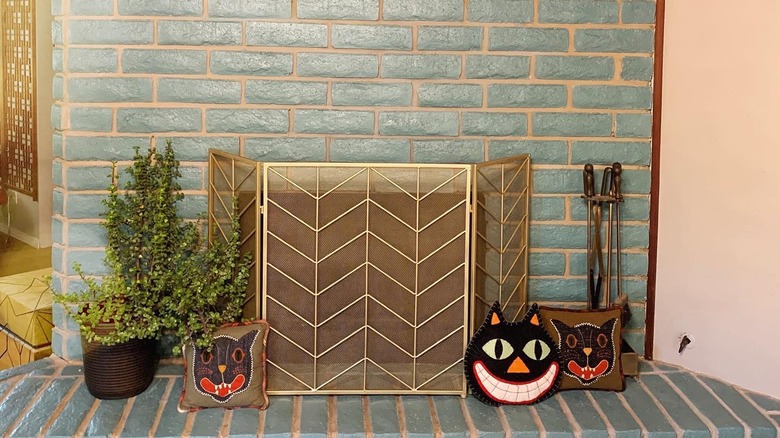The Best Paint Finish For Painting A Brick Fireplace
So you've decided to paint your brick fireplace. Maybe the original red brick just doesn't go with your style, or maybe it got a paint job a few years ago that desperately needs touching up. But once you've decided on your dream fireplace color and found a suitable formula that can withstand high temperatures, you need to choose a paint finish. You can choose between matte, eggshell, or a semi-gloss sheen. The finish of the paint can drastically alter the impact of the color, so it's important to be sure you understand the key differences and make the best decision for your brick fireplace.
Glossy or semi-gloss finish paints on brick are both totally doable, but when it comes to the look and ease of application of the paint, eggshell is the way to go. As a surface, brick has many tiny holes and rough patches, especially if it's an old fireplace, so you generally want to minimize the appearance of those imperfections. Matte paint conceals them much better than semi-gloss, and it's even easier to apply.
Matte finish is a minimizer
Eggshell and semi-matte finishes reflect far less light than glossy coats, similar to how a glass mirror would bounce light more than a piece of slate. While you may want more reflected light in many house projects, that's not really the case for brick fireplaces. For one, if you have an open fire, the eggshell finish will only gently diffuse the warm light of the flames, rather than brighten the room. If you're going for a cozy vibe or if your room is already quite bright, you don't want to add more reflective surfaces with your paint choice. Additionally, the lack of light reflection makes imperfections harder to see, whereas semi-gloss highlights any change in surface texture.
But semi-matte paint isn't just useful because of its low light reflectivity. It's also considerably easier to apply to brick than semi-gloss. Matte paint has high levels of pigment, which means that a single layer will provide a solid coat of color. And it doesn't streak or show brush strokes as much as reflective finishes, so you'll end up painting fewer layers and worrying less about covering up small details.
Semi-gloss can still be the right choice
Don't lose heart if you have your mind set on a semi-gloss paint finish for your brick fireplace. While it requires a little more effort to apply, it can still look great on the bricks. It may be a good call to use a reflective semi-gloss paint if the fireplace is in a dark room, whether that's due to a lack of natural light or décor choices. Using glossy paint will help bounce more light into the room whether or not the fire is lit. It can also saturate the pigments of your paint color if you want to make it appear a touch richer or darker. And if you have other features in the room that are painted with semi-gloss, you may prefer to keep the look cohesive on the fireplace.
Though matte paint is easier to apply, it's also harder to keep clean and is less durable. Semi-gloss has a smoother, slicker texture, which makes it less prone to moisture retention. That makes it easier to give it a wipe down with some hot water and a spray cleaner, so if you use your fireplace frequently and want to be able to wipe ash and soot residue without much fuss, semi-gloss is a fantastic option. In order to make the application process a bit easier and streak-free, be sure to use a paint primer that is intended for mortar, as this will help the semi-gloss to adhere easily and evenly.


